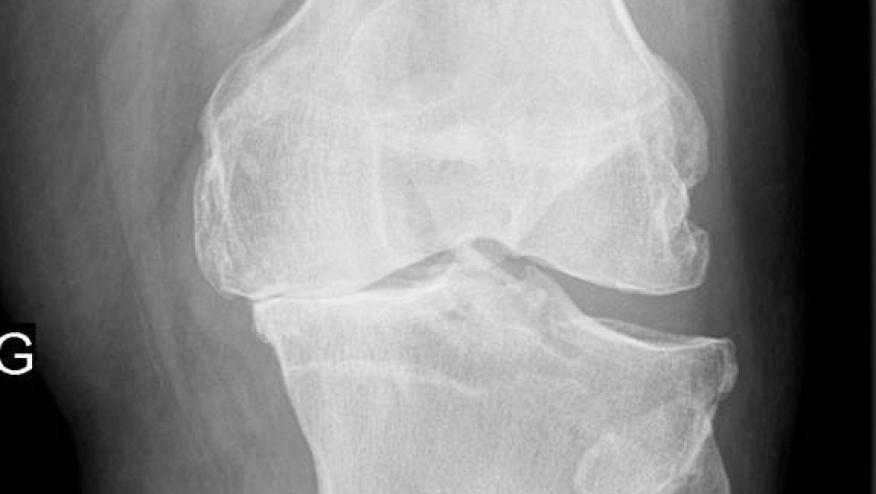Metformin Effective in Osteoarthritis Save

- Limited evidence has suggested that metformin could reduce some of the pathology underlying osteoarthritis (OA).
- Researchers conducted a small randomized trial to assess metformin's effectiveness in knee OA, with pain intensity after 6 months as the primary outcome.
- Metformin produced significantly more pain relief than was seen in a placebo group, although the difference was of marginal clinical importance.
The diabetes drug metformin provided overweight/obese patients with osteoarthritis (OA) of the knee with significantly greater pain relief than did placebo in a small randomized trial, researchers said.
After 6 months of treatment, those on metformin scored their knee pain a mean 31.3 points lower than at baseline on a 100-point scale, compared with an 18.9-point average decrease in the placebo group (P=0.01), according to Flavia M. Cicuttini, PhD, of Monash University in Melbourne, Australia, and colleagues.
The results were published late Thursday in JAMA and were also presented at the Osteoarthritis Research Society International's annual meeting in Seoul, South Korea.
While the 11.4-point advantage for metformin fell short of the investigators' "minimum clinically important difference" of 15 points, they nevertheless pronounced metformin the winner. "These results support use of metformin for treatment of symptomatic knee OA in people with overweight or obesity," they wrote.
But, they added, "[b]ecause of the modest sample size [107 patients overall], confirmation in a larger clinical trial is warranted."
For years, virtually the entire rheumatology, orthopedics, and gerontology community has been hunting for an easy to use, safe drug that could address OA's underlying pathology. Current medical therapy, based on acetaminophen, non-steroidal anti-inflammatory drugs (NSAIDs), and intraarticular injections, are only palliative. Thus, the notion that metformin -- widely used for decades in type 2 diabetes and considered one of the safest medications ever found -- could treat OA is like discovering the Holy Grail on a flea market table.
This notion did not arise out of the blue. Metformin, of course, has been the backbone of type 2 diabetes treatment for years, with an unsurpassed safety record. But numerous other benefits unconnected (at least directly) to its effects on glucose metabolism have been suggested in studies: cutting risks for gout, lupus nephritis, dementia, macular degeneration, complications from long-term corticosteroid use, and even "long COVID. Perhaps most relevant to the current study, researchers last year reported that diabetic patients on metformin experienced 30% lower rates of joint replacement surgery. OA is the chief reason for arthroplasty, and the authors of that study speculated that the drug reduces joint inflammation and keeps chondrocytes active to slow degeneration.
To test a potential benefit directly, Cicuttini and colleagues randomized 107 overweight or obese patients to either oral metformin at 2 g/day or placebo for 6 months. Knee pain was the primary outcome, but the researchers also rated patients on the Western Ontario and McMaster Universities Osteoarthritis Index (WOMAC) and the Outcome Measures in Rheumatology-Osteoarthritis Research Society International (OMERACT-OARSI) scoring system.
Mean patient age was just under 60 and about two-thirds were women. Body mass index values averaged about 33, with similar medians. Most patients showed some degree of joint space narrowing. Median fasting glucose was about 95 mg/dL with an interquartile range of 90-103; people with overt diabetes requiring glucose-lowering therapy were excluded.
As with knee pain as reported by patients on the 100-point scale, metformin was associated with significantly greater improvement in all three WOMAC domains:
- WOMAC pain: metformin, -113.9 points; placebo, -68.2 points (P=0.045)
- WOMAC stiffness: metformin, -56.9 points; placebo, -26.7 points (P=0.01)
- WOMAC function: metformin, -426.1 points; placebo, -221.7 points (P=0.009)
OMERACT-OARSI responder rates stood at 65% with metformin versus 45% with placebo (P=0.07); response in this analysis was defined as either:
- 50% improvement and at least a 20-point decrease in either WOMAC pain or function score, or
- 20% improvement and at least 10-point improvements in both WOMAC pain and function score
Participants also reported knee pain at the 3-month mark, at which point both the metformin and placebo groups had achieved exactly the same degree of relief. During the final 3 months, though, mean scores continued to decrease with metformin whereas they almost completely flattened in the placebo group -- suggesting that continued metformin treatment might have brought even more pain relief.
Adverse events did occur more frequently with metformin (25 vs 16 with placebo). Those that were more common with metformin mainly involved diarrhea and abdominal discomfort. None of the events were considered serious.
The small number of carefully selected participants and relatively short follow-up were the trial's principal limitations. Some 18% of participants failed to show up for the 6-month evaluation (data were imputed for them). Also, a planned extension that would have lasted 24 months and included radiographic evaluations was cancelled for lack of funding. Hence it was left undetermined whether metformin modified OA pathologic processes.
Source Reference: Pan F, et al "Metformin for knee osteoarthritis in patients with overweight or obesity: a randomized clinical trial" JAMA 2025; DOI: 10.1001/jama.2025.3471.
Join The Discussion
Interesting results in a critically important area of unmet need given the high prevalence of knee OA is. More data regarding the potential efficacy and safety benefits of metformin in (post-traumatic) knee OA will emerge from an on-going study funded by the Arthritis Foundation: PIKASO: Preventing Injured Knees From osteoArthritis: Severity Outcomes https://clinicaltrials.gov/study/NCT06096259









If you are a health practitioner, you may Login/Register to comment.
Due to the nature of these comment forums, only health practitioners are allowed to comment at this time.